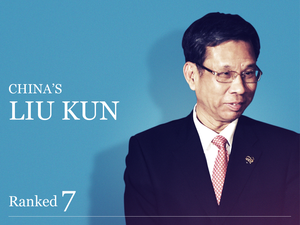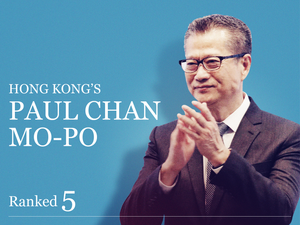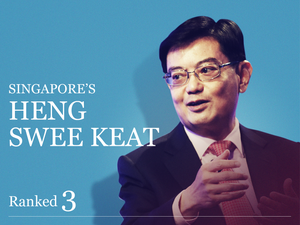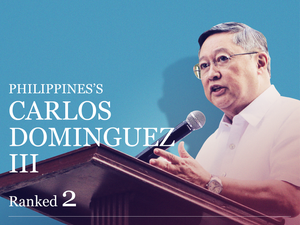Josh Frydenberg is only six months into his role as treasurer of Australia following yet another nasty leadership struggle that saw Scott Morrison take over the prime ministership in August last year.
But he’s made enough of an impression to come in at No. 4 this year in the FinanceAsia finance minister league table. It may not last though if gets voted out later this year.
Frydenberg is a conservative and popular among the Liberal Party’s powerful right-wing factions. He’s also got an atypical backstory: as a school-leaver, he tried his luck as a semi-professional tennis player and then studied law and economics at Monash University in Melbourne, before joining Mallesons Stephen Jacques and Deutsche Bank, becoming a policy advisor to former prime minister John Howard and running for parliament in 2010.
Frydenberg is smart and articulate but he is still finding his feet. “It takes time for people to grow into the role and learn how to formulate and communicate economic policy to the people,” said Shane Oliver, head of investment strategy at AMP Capital. “There has been so much instability in government it is difficult for our politicians to explain themselves and build trust.”
Luckily for Frydenberg, the Australian economy seems immune to the political gyrations, largely because monetary policy is managed by the Reserve Bank of Australia.
In 2018, Australian GDP grew by 2.8% while inflation eased to 1.9% from 2.1% in 2017, according to figures from the central bank.
Jobs growth was strong at 2.5%, putting the national unemployment rate at 5%, and wage growth also improved to 2.3% in 2018 from a low of 1.9% in 2017. Net debt stands at less than 20% of GDP, which is low by developed economy standards.
Australia’s healthy report card has little to do with the government driving important structural reforms, let alone Frydenberg’s influence. The real drivers of the economy have been the recent improvement in global commodity prices, although robust business sentiment under his limited tenure has continued to create jobs.
If anything, the central government has helped by keeping a tight hold of the fiscal strings. “The relative strength of the economy has made it easier for the government to contain spending,” Oliver said, acknowledging that most capital expenditure on infrastructure projects in Australia is carried out by the country’s states and territories.
Still, with revenues up and spending down there is a strong possibility that the budget will be back in balance by mid-2020.
The Australian people may never get the chance to hear Frydenberg articulate a clear medium-term plan for the economy. A general election is set for May this year and if the opposition Labor Party is triumphant, the country will get its sixth treasurer in as many years — most likely Chris Bowen.
Whoever holds the position at The Treasury after the election will do well to find new sources of growth beyond the mining sector and population inflows.
“Australia’s performance has been exaggerated by the fact that we keep adding people,” David Plank, head of Australia economics at ANZ in Sydney, said. Since 1990, the population has grown by more than 32%. “On a per-capita basis our economic performance doesn’t stand out. Real income per person has barely changed over the past decade. We need a real boost in productivity.”
Plank also believes the outlook for employment could turn negative as businesses find it hard to access credit. The recent inquiry into misconduct in the financial services sector has seen banks tighten their lending practices.
The first to feel this credit pinch are likely to be small- to medium-sized businesses.
¬ Haymarket Media Limited. All rights reserved.
$(document).ready(function () {
googletag.cmd.push(function () {
googletag.defineSlot(‘/5450/new-financeasia/sidebar/sidebar-content’, [[300, 250], [300, 600]], ‘gpt-ad-sidebar-c725a636403a41eb86c6aaeed5704192’).addService(googletag.pubads());
googletag.pubads().enableSingleRequest();
googletag.pubads().collapseEmptyDivs(true);
googletag.enableServices();
});
$(‘#js-ad-c725a636403a41eb86c6aaeed5704192’).append(“
“);
googletag.cmd.push(function () {
googletag.display(‘gpt-ad-sidebar-c725a636403a41eb86c6aaeed5704192’);
});
googletag.cmd.push(function () {
googletag.pubads().addEventListener(‘slotRenderEnded’, function (event) {
if (event.slot.getSlotElementId().indexOf(‘gpt-ad-prestitial’)!==-1) {
if (!event.isEmpty) {
console.log(“presad”)
if (navigator.cookieEnabled)
window.prestAd.initCookie(10)
else if (window.localStorage) {
window.prestAd.initLocalStorage(10)
} else
console.log(‘no cookie & localstorage’);
}
}
});
});
});
Source : https://www.financeasia.com/article/josh-frydenberg-keeping-a-tight-rein-on-expenditure/450453








